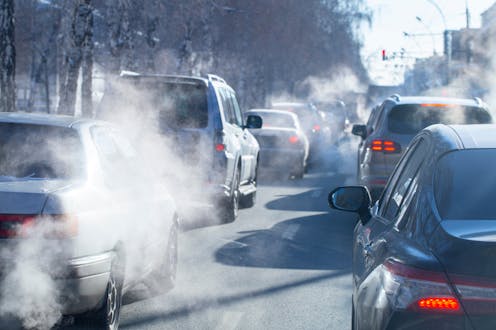A rapid shift to electric vehicles can save 24,000 lives and leave us $148bn better off over the next 2 decades
- Written by Hussein Dia, Professor of Future Urban Mobility, Swinburne University of Technology

Reducing air pollution from road transport will save thousands of lives[1] and improve the health[2] of millions of Australians. One of the quickest ways to do this is to accelerate the current slow transition to electric vehicles[3].
Our newly published research[4] evaluated the costs and benefits of a rapid transition. In one scenario, Australia matches the pace of transition of world leaders such as Norway[5]. Our modelling estimates this would save around 24,000 lives by 2042. The resulting greenhouse emission reductions over this time would almost equal Australia’s current total annual emissions[6] from all sources.
We also calculated the total costs and benefits through to 2042. Australia would be about A$148 billion better off overall with a rapid transition.
Read more: Australia is failing on electric vehicles. California shows it's possible to pick up the pace[7]
Air pollution causes thousands of deaths
Every year, around 2,600 deaths[8] in Australia are attributed to fine-particle air pollution. The main sources of this pollution are transport and industrial activities such as mining and energy generation.
An estimated 1,715 deaths[9] were attributed to vehicle exhaust emissions in 2015. This was 42% more than the road toll[10] that year.
Vehicle emissions increase respiratory infections as well, particularly in young children[11]. Transport pollution contributes to many diseases[12], including lung cancer, heart disease, pneumonia, asthma and diabetes. It has also been linked to Alzheimer’s disease[13].
A 2019 study[14] by the Electric Vehicle Council and Asthma Australia found vehicle emissions had 21,000 serious health impacts each year in New South Wales alone.
A Grattan Institute study[15] last month showed exhaust-pipe pollutants from trucks kill more than 400 Australians every year.
Read more: Australia could rapidly shift to clean transport – if we had a strategy. So we put this plan together[16]
The benefits greatly outweigh the costs
Our new Swinburne University of Technology research[17] evaluated the benefits of a transition to electric vehicles by considering public health, household and emissions reductions savings. We compared the benefits with costs, including charging infrastructure outlay, higher purchase prices for electric vehicles and green energy package costs – for household solar panels, battery storage and charging points.
Each electric vehicle was considered to have been bought along with a green energy package. The package minimises emissions and demands on electricity grid capacity, while increasing the benefits for households.
The study explored three scenarios:
slow scenario – business-as-usual, with electric vehicle sales increasing slowly from the current rate (a 5% increase in the first year, followed by a 10% yearly increase)
accelerated market-based scenario – aligns with the highest rates of adoption around the world like those in Norway (where 64% of new vehicles sold[18] in 2021 were battery-powered), increasing by 5% every year
aggressive regulatory scenario – assumes all new vehicle sales would be electric in the base year as a result of government regulation.
The main differences between the scenarios are the rate of electric vehicle uptake (once consumers decide to retire their current vehicles) and the degree of government intervention.
References
- ^ thousands of lives (www.mdpi.com)
- ^ improve the health (www.health.vic.gov.au)
- ^ slow transition to electric vehicles (theconversation.com)
- ^ research (www.sciencedirect.com)
- ^ Norway (thedriven.io)
- ^ total annual emissions (www.industry.gov.au)
- ^ Australia is failing on electric vehicles. California shows it's possible to pick up the pace (theconversation.com)
- ^ 2,600 deaths (www.mdpi.com)
- ^ 1,715 deaths (nespurban.edu.au)
- ^ road toll (www.bitre.gov.au)
- ^ particularly in young children (electricvehiclecouncil.com.au)
- ^ contributes to many diseases (theicct.org)
- ^ linked to Alzheimer’s disease (www.ncbi.nlm.nih.gov)
- ^ 2019 study (electricvehiclecouncil.com.au)
- ^ Grattan Institute study (grattan.edu.au)
- ^ Australia could rapidly shift to clean transport – if we had a strategy. So we put this plan together (theconversation.com)
- ^ research (www.sciencedirect.com)
- ^ 64% of new vehicles sold (eletric-vehicles.com)
- ^ Australia’s emissions from all sources in 2021 (www.industry.gov.au)
- ^ Who's holding back electric cars in Australia? We've long known the answer – and it's time to clear the road (theconversation.com)
- ^ Climate Change Act (www.aph.gov.au)
- ^ 43% cut in emissions by 2030 (www.pm.gov.au)
- ^ Four ways our cities can cut transport emissions in a hurry: avoid, shift, share and improve (theconversation.com)

















